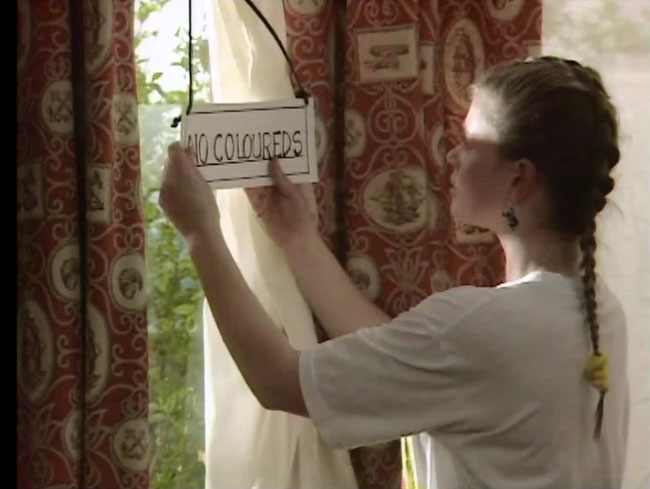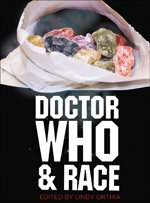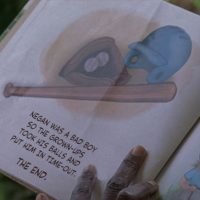
 Doctor Who and Race
Doctor Who and Race is collection of 23 essays of politically correct gobbledygook that explores the “darker side to Doctor Who.” Editor Lindy Orthia says, “The biggest elephant in the room is the problem privately nursed by many fans of loving a TV show when it is thunderingly racist.”
This is one of the few instances where you can judge a book by its cover, which features a “white” bag of jelly babies that is apparently a metaphor for whitewashing racism.
Orthia explains:
[Doctor Who’s] consistency in what humanity looks like constructs human diversity as an unremarkable and timeless fact. It casts racist attitudes as threatening, but in the grand scheme of human history, anomalous. The urge to a cosmopolitanism of “many colours one culture” is thus naturalized and essentialized. There are no deep power relations; there is only eternal humanity, different in colour but united in all other respects. This is no melting pot, it is no salad bowl. The appropriate metaphor comes from Doctor Who’s most famous foodstuff: humanity is so many coloured jelly babies inside a colourless (white) paper bag.
One specific episode criticized is “Four to Doomsday,” in which the Fifth Doctor (Peter Davison) and Teagan (Janet Fielding) encounter an Aborigine named Kurkutji. Orthia notes that the Australian actress raised concerns over the use of a generic Aboriginal language, which was ultimately changed to a real one (Tiwi) but that still wasn’t authentic enough for her. She calls it cringe-worthy that Teagan just so happens to be fluent in the language, which is one of hundreds of indigenous to Australia.
It is distinct language she emphatically states:
The Doctor calling Kurkutji’s tongue a ‘dialect’ is a diminution of the language to the status of ‘regional variant’, denying its distinctiveness and that of the Indigenous nation it is associated with. This is historically typical of the way Europeans and white Australians have presumed Australian Indigenous cultures are homogeneous.
Orthia seems to have mistaken a show about time travel with a historical documentary.
Contributor Amit Gupta even criticizes Peter Davison’s choice of wardrobe as being that of an “amateur English cricketer of the late 19th Century when the game was characterised by both racial and class distinctions.”
Gupta educates us:
Cricket also had a role in maintaining the status of British imperialism through the exercise of soft power as it was successfully inculcated by the colonial elites. Davison’s cricketing Doctor once again saw the BBC using Who to promote a racial and class nostalgia that had already outlived its validity.
Another contributor, who goes by the pen name Fire Fly, wonders why the Doctor doesn’t go back in time and end slavery. If she was actually a fan of the show, she’d know that is what’s called a “fixed point in time.”
All these subjects have been broached in “Remembrance of the Daleks” which revolves around a race war between to factions of Daleks that appropriately colored white and black. The episode is set in 1963 so the theme segregation has a real world parallel. The Doctor’s companion, Ace (Sophie Aldred), discovers a sign that reads: “No coloureds.” Even the idea of undoing slavery is discussed, literally. The Doctor (Sylvester McCoy) asks John (Joseph Marcell) if having sugar in his tea make a difference in the grand scheme of things. The answer is clearly none but what if no one used sugar he ponders.
“If this sugar thing had never started, my great grandfather wouldn’t have been kidnapped, chained up and sold in Kingston in the first place,” John reasons. “I’d be an African.”
The Doctor concludes that ripples in time have unforeseen consequences.
“Life’s like that,” John replies. “Best thing is just to get on with it.”
That’s good advice. If the Doctor ever did retroactively abolish slavery, it would ironically negate this entire book.
A spokesperson for the BBC issued the following response:
Doctor Who has a strong track record of diverse casting among both regular and guest cast. Freema Agyeman became the first black companion and Noel Clarke starred in a major role for five years [Mickey Smith].
Reflecting the diversity of the UK is a duty of the BBC, and casting on Doctor Who is colour-blind. It is always about the best actors for the roles.
Is Doctor Who racist?
Vote in the poll at the top of the page.





